

Togo. Togo ( i/ˈtoʊɡoʊ/), officially the Togolese Republic (French: République Togolaise), is a country in West Africa bordered by Ghana to the west, Benin to the east and Burkina Faso to the north.
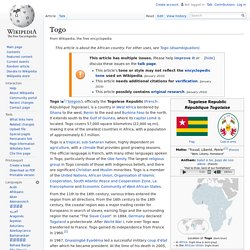
It extends south to the Gulf of Guinea, where its capital Lomé is located. Togo covers 57,000 square kilometres (22,000 sq mi), making it one of the smallest countries in Africa, with a population of approximately 6.7 million. Sierra Leone. Sierra Leone ( i/sɪˈɛərə lɪˈoʊni, -lɪˈoʊn/),[5] officially the Republic of Sierra Leone, is a country in West Africa.
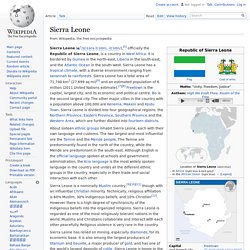
It is bordered by Guinea in the north-east, Liberia in the south-east, and the Atlantic Ocean in the south-west. Sierra Leone has a tropical climate, with a diverse environment ranging from savannah to rainforests. Sierra Leone has a total area of 71,740 km2 (27,699 sq mi)[6] and an estimated population of 6 million (2011 United Nations estimate).[7][8] Freetown is the capital, largest city, and its economic and political centre. Bo is the second largest city. About sixteen ethnic groups inhabit Sierra Leone, each with their own language and customs. Sierra Leone is a nominally Muslim country,[9][10][11] though with an influential Christian minority. Sierra Leone has relied on mining, especially diamonds, for its economic base.
Sierra Leone became independent in 1961. History[edit] Senegal. Senegal ( i/ˌsɛnɨˈɡɔːl, -ˈɡɑːl/;[5][6] French: le Sénégal), officially the Republic of Senegal (French: République du Sénégal [ʁepyblik dy seneɡal]), is a country in West Africa.
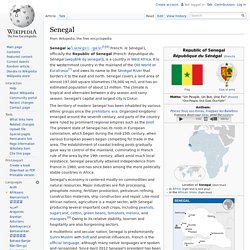
It is the westernmost country in the mainland of the Old World or Eurafrasia[7] and owes its name to the Sénégal River that borders it to the east and north. Senegal covers a land area of almost 197,000 square kilometres (76,000 sq mi), and has an estimated population of about 13 million. The climate is tropical and alternates between a dry season and rainy season. Senegal's capital and largest city is Dakar. Saint Helena. It is one of the most remote islands in the world, and was uninhabited when discovered by the Portuguese in 1502.
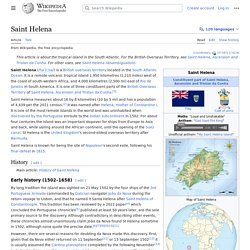
It was an important stopover for ships sailing to Europe from Asia and South Africa for centuries. Napoleon was imprisoned there in exile by the British, as was Dinuzulu kaCetshwayo (for leading a Zulu army against British rule) and more than 5,000 Boers taken prisoner during the Second Boer War, including Piet Cronjé.[4] Saint Helena is Britain's second-oldest overseas territory after Bermuda. History of Saint Helena[edit] Nigeria. Not to be confused with the neighbouring country Niger.
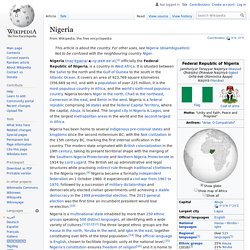
Federal Republic of Nigeria, commonly referred to as Nigeria. Niger. Niger (
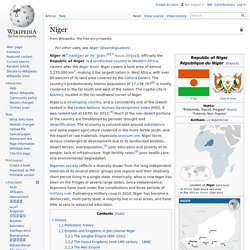
Mauritania. This article is about the modern country.
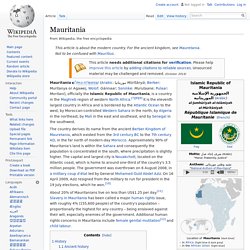
For the ancient kingdom, see Mauretania. Mauritania. Mali. Coordinates: Mali (/ˈmɑːli/ (
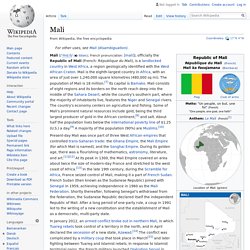
Liberia. Country on the Atlantic coast of West Africa Coordinates: 6°30′N 9°30′W / 6.500°N 9.500°W / 6.500; -9.500 Liberia (), officially the Republic of Liberia, is a country on the West African coast.
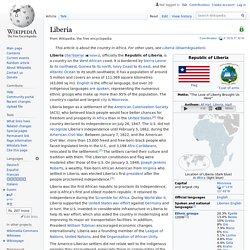
It is bordered by Sierra Leone to its northwest, Guinea to its north, Ivory Coast to its east, and the Atlantic Ocean to its south-southwest. It has a population of around 5 million and covers an area of 111,369 square kilometres (43,000 sq mi). Ivory Coast. Ivory Coast ( i/ˌaɪvəri ˈkoʊst/) or Côte d'Ivoire (/ˌkoʊt dɨˈvwɑr/;[7] KOHT dee-VWAHR; French: [kot divwaʁ]), officially the Republic of Côte d'Ivoire (French: République de Côte d'Ivoire), is a country in West Africa.
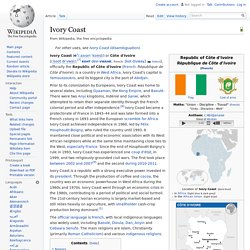
Ivory Coast's capital is Yamoussoukro, and its biggest city is the port of Abidjan. Guinea-Bissau. Guinea. Coordinates: Guinea (/ˈɡɪni/ ( Guinea is a predominantly Islamic country, with Muslims representing 85 percent of the population.[11][12][5] Guinea's people belong to twenty-four ethnic groups. French, the official language of Guinea, is the main language of communication in schools, in government administration, and the media, but more than twenty-four indigenous languages are also spoken.
Guinea's economy is largely dependent on agriculture and mineral production.[13] It is the world's second largest producer of bauxite, and has rich deposits of diamonds and gold.[14] The country was at the core of the 2014 Ebola outbreak. Human rights in Guinea remain a controversial issue. History[edit] Ghana. Ghana ( i/ˈɡɑːnə/), officially called the Republic of Ghana, is a sovereign state and unitary presidential constitutional republic, located along the Gulf of Guinea and Atlantic Ocean, in West Africa.
The country is bordered by the Ivory Coast in the west, Burkina Faso in the north, Togo in the east and the Gulf of Guinea and Atlantic Ocean in the south. The word Ghana means "Warrior King".[7] Prior to colonization by the British in the mid-19th century, Ghana was the site of numerous kingdoms and empires. In 1957, it became the first African nation to declare independence from European colonization.[8][9][10] This made Ghana the symbol of Black achievement and it sparked the interest of other African Nations to seek independence as well; it also had a great influence on Pan-Africanism and the Black Pride movements in the United States of America.[11][12] Name and etymology[edit] History[edit] The Gambia.
Burkina Faso. Burkina Faso ( i/bərˈkiːnə ˌfɑːsoʊ/ bər-KEE-nə FAH-soh; French: [buʁkina faso]) is a landlocked country in West Africa around 274,200 square kilometres (105,900 sq mi) in size. It is surrounded by six countries: Mali to the north; Niger to the east; Benin to the southeast; Togo and Ghana to the south; and Ivory Coast to the southwest. Its capital is Ouagadougou. As of 2014, its population was estimated at just over 17.3 million.[4] Formerly called the Republic of Upper Volta, the country was renamed "Burkina Faso" on 4 August 1984 by then-President Thomas Sankara. Benin. Découvrir le Cap-Vert et sa culture Cap-Vert. République du Cap-Vert República de Cabo Verde (pt) Les îles étaient inhabitées avant l'arrivée des premiers explorateurs portugais en 1456. Première colonie européenne dans les tropiques, elle sert de tête de pont à la traite des esclaves et au commerce triangulaire. Le Cap-Vert attire alors de nombreux corsaires et pirates, parmi lesquels Francis Drake vers 1580.
Le naturaliste Charles Darwin visite également l'archipel en 1832. De nos jours, le Cap-Vert possède une économie centrée sur la production de services, notamment dans le tourisme. West Africa. The Maghreb, a separate region to West Africa. Youssou N’Dour : "Je ne suis pas politiquement correct" Après avoir été ministre de la Culture, puis du Tourisme et des Loisirs depuis 2012. Youssou N’Dour est classé par le magazine "Time" parmi les 100 personnes les plus influentes de la planète ce que le chanteur ne contredira pas lors de cet entretien, il souhaite que sa vision de faire de la politique soit avant tout originale.
Si Youssou N’Dour ne veut pas trop parler de sa fortune personnelle, son influence est très importante au Sénégal. Il détient un club, un groupe de presse "Futurs Media" avec notamment une radio, une télé et le quotidien le plus lu du pays qui n’est d’ailleurs pas toujours tendre avec ses disques, mais ici le chanteur dit laisser faire les journalistes, "Ils sont complètement libres d’écrire ce qu’ils veulent, de commenter et d’apprécier" rappelle-t-il. Youssou n'dour explique pourquoi il est influent ! Youssou n'dour dit respecter la liberté de la presse. Portail:Culture ivoirienne.